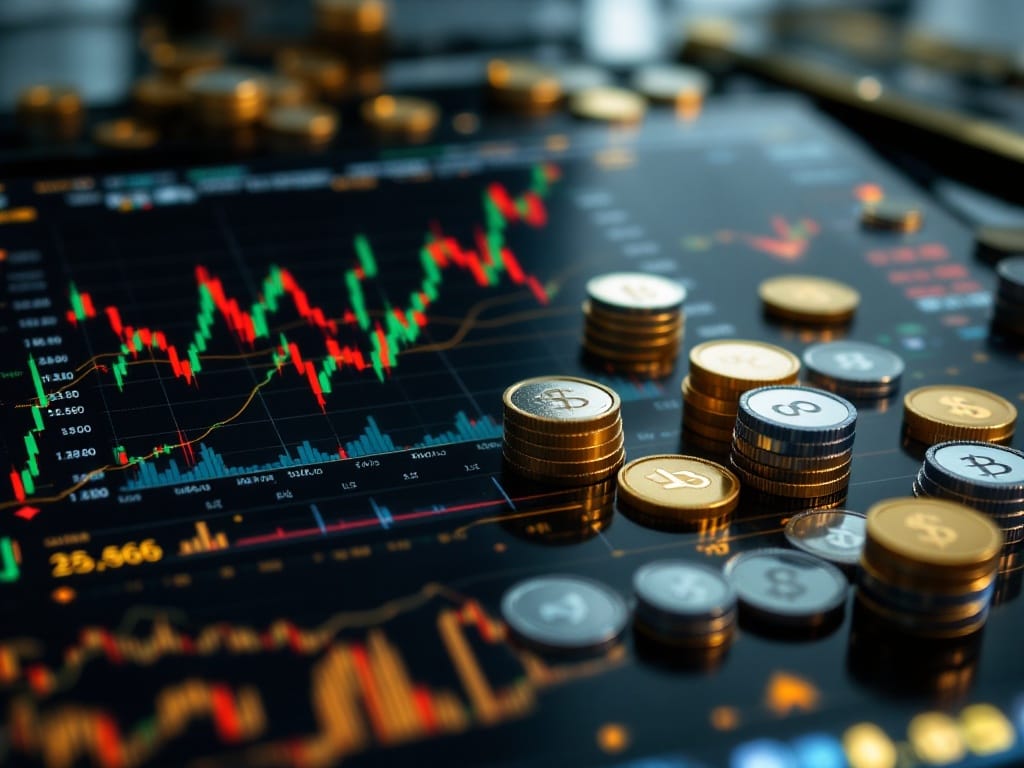Forex vs Futures Trading: How They Compare

Introduction to Forex vs Futures Trading
When it comes to trading financial markets, the choice between forex vs futures can feel like deciding between pizza and sushi—both are great, but they serve very different tastes. These markets offer unique opportunities, but they also appeal to different types of traders. Whether you're new to trading or a seasoned market dweller, understanding the distinction is crucial to your success.
In this blog, we’re diving deep into the world of forex and futures. We'll compare their structures, benefits, and costs, and help you decide whether you should be trading forex or futures. So, buckle up, because we’re about to demystify the differences between these two popular markets in a way that’s as engaging as it is educational.
By the end of this post, you’ll not only understand the difference between forex and futures but also which one aligns best with your trading style and goals.
What is Forex Trading?
Forex trading—or currency trading—is the global marketplace for exchanging one currency for another. It’s like the financial world’s version of a bustling marketplace, where the euro, dollar, yen, and other currencies are the stars of the show.
The forex market is open 24/5, operating across major markets in London, New York, Tokyo, and Sydney. This accessibility makes it incredibly popular among traders who love the flexibility of trading at their convenience. Additionally, forex trading often involves high leverage, allowing traders to control large positions with a smaller amount of capital. Forex trading, also known as currency trading futures, represents the largest financial market globally where traders exchange one currency for another.
For example, if you’ve ever exchanged money for a trip abroad, you’ve already participated in forex trading! But instead of just buying euros for your holiday, forex traders aim to profit from fluctuations in exchange rates.

What is Futures Trading?
Futures trading is a bit like making a deal with someone to buy or sell something at a set price in the future. These contracts can apply to everything from commodities like gold and oil to financial instruments like interest rates and stock market indices.
Unlike forex, which is centered on currency pairs, futures trading spans a broader range of markets. Traders use futures to speculate on price movements or hedge existing positions to manage risk. Futures contracts have fixed expiry dates, which can be both a blessing and a curse, depending on your trading strategy.
For example, if you think gold prices will rise, you might buy a gold futures contract. If your prediction is correct, you can sell the contract for a profit before it expires. However, futures trading requires a solid understanding of market dynamics and the ability to manage risks effectively.
Understanding futures vs forex trading requires grasping how futures contracts work as standardized agreements to buy or sell assets at predetermined future dates and prices. When comparing cfd vs futures trading, futures contracts offer more regulatory oversight and are traded on centralized exchanges, unlike CFDs which are over-the-counter instruments. The difference between futures and forex becomes apparent in how futures contracts cover a wide range of assets beyond just currencies, including commodities, indices, and interest rates. Trading futures vs forex requires understanding contract specifications, expiration dates, and delivery terms, though most traders close positions before expiration

Key Differences Between Forex vs Futures Trading
Market Structure
The forex market is decentralized, meaning there’s no central exchange. Instead, trades occur over-the-counter (OTC) through networks of banks, brokers, and financial institutions. This provides unmatched liquidity but also less transparency.
In contrast, futures trading occurs on centralized exchanges, such as the Chicago Mercantile Exchange (CME). These exchanges offer greater transparency and regulatory oversight, which can be reassuring for new traders.
The fundamental difference between forex and futures lies in their market organization, with forex operating as a decentralized network while futures trading occurs on regulated exchanges. When comparing forex trading vs futures, traders must understand that forex markets operate through interbank networks, while futures vs forex trading takes place on centralized exchanges like the CME. The structure of futures vs cfd trading offers more transparency and standardization compared to both forex and CFDs. Trading forex vs futures requires understanding these structural differences as they impact everything from price discovery to execution.
Types of Instruments
Forex trading focuses solely on currency pairs, like EUR/USD or USD/JPY. Meanwhile, futures markets offer contracts for commodities (like crude oil), financial instruments (like Treasury bonds), and even stock indices (like the S&P 500).
If you’re looking to trade beyond currencies, futures vs forex trading might be the better choice for you.
When evaluating forex or futures markets, the range of available instruments marks a crucial distinction, with futures offering a broader selection beyond currency pairs. The comparison of cfd vs futures contract types reveals that futures contracts cover commodities, indices, and interest rates, while CFDs vs futures show more flexibility but less standardization. Trading currency futures combines elements of both forex futures trading and traditional futures markets, offering regulated exposure to currency movements. For traders considering futures and forex, understanding these instrument differences helps in selecting the most appropriate market for their strategy.
Leverage and Margins
Forex trading is known for its high leverage. Some brokers offer up to 500:1 leverage, meaning you can control $50,000 with just $100. While this can amplify gains, it also magnifies losses.
Futures trading offers leverage too, but it’s typically lower and varies depending on the contract. This makes futures slightly less risky in terms of capital exposure—though risk management is still essential.
The debate between forex trading vs futures often centers around leverage and margin requirements, with forex typically offering higher leverage ratios. When comparing futures vs forex trading, traders must consider that futures margins are standardized by exchanges, while forex leverage can vary significantly between brokers. Trading futures vs forex requires understanding that while both markets offer leverage, the approach to margin calculations and maintenance differs substantially. The difference between forex and futures leverage structures impacts both risk management and capital efficiency.
Liquidity and Volatility
The forex market is the most liquid financial market in the world, with an average daily trading volume exceeding $6.6 trillion. This exceptional liquidity ensures tight spreads and minimal slippage, making it easier to enter and exit positions quickly. Futures markets also offer significant liquidity, particularly in major contracts like E-mini S&P 500 futures, but the liquidity varies considerably between different contracts and trading sessions. Volatility patterns in forex tend to be more predictable, following global trading sessions, while futures volatility often correlates with specific market events, economic releases, and seasonal factors. Understanding these liquidity and volatility patterns is crucial for developing effective trading strategies in either market.
When evaluating cfd trading vs futures and forex markets, liquidity considerations become crucial for execution quality and trading costs. Trading forex vs futures requires understanding how these liquidity differences affect trading strategies and risk management approaches.
Trading Goals and Timeframes
Forex trading offers flexibility across multiple timeframes, from scalping opportunities in minutes to position trading over weeks or months. The continuous nature of the forex market makes it particularly suitable for day traders and swing traders who need to manage positions across different sessions. Futures trading, with its contract expiration dates, naturally aligns with specific timeframes and can be better suited for traders with defined market views or hedging requirements. The choice between forex and futures often depends on your trading goals – whether you're focusing on short-term price action, looking to hedge existing positions, or implementing longer-term trading strategies. Additionally, futures traders must consider roll-over periods when contracts expire, which can impact trading timeframes and costs.
Forex vs Futures Costs and Fees
When comparing forex vs futures trading, costs are a major consideration. Forex brokers often charge spreads (the difference between the bid and ask price) and sometimes additional commissions. These costs can add up, especially for high-frequency traders.
Futures traders, on the other hand, usually pay a fixed commission per contract. This structure can be more predictable, though it varies by broker and contract type.
Additionally, forex trading often involves overnight rollover fees, while futures trading has no such cost due to its fixed expiry dates.
Forex vs Futures for Beginner Traders
Evaluating Market Access: Trading Hours and Venues
Forex markets are open 24/5, making them highly accessible for beginners who may be balancing trading with other commitments. Futures markets, while not 24/7, also offer extended hours depending on the exchange.
Analyzing Risk and Leverage: What Beginners Should Know
Beginners often gravitate toward forex because of its lower capital requirements. However, the high leverage can be a double-edged sword. Futures trading offers slightly lower risk in terms of leverage but requires a more significant initial investment.
Choosing Your Path: Tips for Starting in Forex vs Futures Trades
If you’re just starting out, test the waters with a demo account. Whether you’re trading forex futures or diving into CFDs vs futures, practicing without risk will help you build confidence and refine your strategy.
What Are the Main Benefits of Trading Futures vs Forex?
Regulatory Oversight Ensures Transparency
Futures markets are heavily regulated, which ensures fair trading practices and transparency. Forex markets, being decentralized, lack this level of oversight, which can make them riskier for beginners.
Access to Diverse Markets Beyond Currencies
Futures trading allows you to speculate on commodities, indices, and more. If you’re interested in diversification, futures markets offer a wider range of opportunities compared to forex.
Predictable Pricing with Set Expiry Dates
Futures contracts have fixed expiry dates, which makes pricing more predictable. This can be beneficial for traders looking to hedge risks or plan longer-term trades.
Hedging Capabilities to Manage Risk
Hedging is a popular strategy in futures trading, allowing traders to offset potential losses in their primary investments. For instance, an airline might use oil futures to hedge against rising fuel costs.
High Liquidity in Major Contracts
Major futures contracts, like those for crude oil or the S&P 500, offer high liquidity. This ensures quick execution and tight spreads, which are crucial for active traders.
Final Words on Forex vs Futures Trading
Whether you choose to trade forex or futures, the key is to align your trading style with the market’s characteristics. Forex offers flexibility and accessibility, while futures provide diversity and transparency. Both have their pros and cons, and neither is inherently better—it’s all about what works for you.
At Funded Futures Network, we specialize in helping traders succeed in the futures market. With our evaluation programs and funding options, you can trade with confidence and keep the profits you earn!
FAQs About Forex vs Futures
Can You Trade Futures 24/7 Like Forex?
Not exactly. While forex operates 24/5, futures markets have specific trading hours, though they often include extended sessions.
How Does Leverage Differ in Forex vs Futures?
Forex offers higher leverage, but futures leverage is more stable and varies by contract.
Which Is Better for Short-Term Trading: Forex vs Futures?
Forex is typically better for short-term traders due to its high liquidity and tighter spreads.
What Are the Risks of Trading Futures vs Forex?
Both markets carry risks, but forex’s high leverage can lead to significant losses. Futures risks are tied to margin requirements and market volatility.
How Do Transaction Costs Compare Between Forex vs Futures?
Forex costs include spreads and rollover fees, while futures costs are typically fixed commissions.
FAQs About Funded Futures Network
Does Funded Futures Network Provide Tools for Both Forex and Futures Trading?
FFN focuses on futures trading but offers resources to help you succeed in this market. Funded Futures Network only offers futures trading. You can trade some currencies at FFN however, when you trade currency it would be considered a currency future and not a Forex pair.
How Can I Get Started with Futures Trading at Funded Futures Network?
Simply complete our evaluation program to qualify for a funded account. Once you pass the evaluation, you make up your pre-determined amount in your exhibition account which gets rolled over to your funded account. You can then start earning profits in your Funded Futures Network Funded account.
What Funding Options Are Available for Traders at Funded Futures Network?
We offer funded accounts up to $250,000 for successful traders. The most popular accounts are $50,000 and $150,000.
Can International Traders Participate in Funded Futures Network Programs?
Yes! FFN welcomes traders from around the globe. Be sure to see the restricted countries list before you sign up! This is located on the FAQ page of our website.
What Trading Tools Does Funded Futures Network Utilize?
We provide traders with cutting-edge tools, platforms, and resources for successful futures trading.
Now that you’re equipped with the knowledge of forex vs futures trading, it’s time to explore your options and start trading with confidence. Ready to take your trading to the next level? Join the Funded Futures Network today!



